John Janaro's Blog, page 250
August 15, 2015
The "Dormition": Mary is Born into Eternal Life
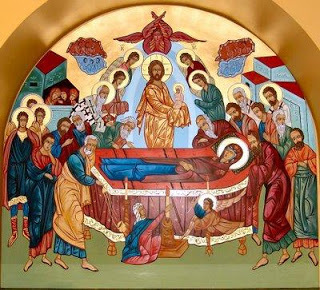 Today's beautiful Feast Day is known in the Eastern churches as the "Dormition" of the Theotokos (the "falling asleep" of the Mother of God). The point of this complimentary emphasis not to decide the theological question of whether or not Mary actually died (i.e. in the same way we do). "Falling asleep," after all, is a metaphor for death in the New Testament and among the early Christians (see e.g. 1 Corinthians 15:6). Rather, it is to focus on the unique nature of Mary's passing from this life into eternal glory, body and soul, in the fullness of resurrected life.
Today's beautiful Feast Day is known in the Eastern churches as the "Dormition" of the Theotokos (the "falling asleep" of the Mother of God). The point of this complimentary emphasis not to decide the theological question of whether or not Mary actually died (i.e. in the same way we do). "Falling asleep," after all, is a metaphor for death in the New Testament and among the early Christians (see e.g. 1 Corinthians 15:6). Rather, it is to focus on the unique nature of Mary's passing from this life into eternal glory, body and soul, in the fullness of resurrected life.The icon of the Dormition often presents images of Mary's earthly life coming to an end, surrounded by the apostles. Above her is the image of the glorified Christ carrying Mary, who is represented as a baby wrapped in swaddling clothes (which are not unlike burial cloths). Just as Mary gave birth to the Incarnate Jesus in this world, so the Glorified Jesus brings about Mary's "birth" into eternal glory in a manner that is likewise fully incarnate, involving the glorification of her whole concrete humanity even "now," by anticipation, in this present age. The Theotokos is borne by her Son into the completion of Divine transfiguring life.
Thus the Kingdom has come in its fullness; the New Creation has begun, and the New Adam and the New Eve already dwell bodily in this "Paradise restored," where every aspect of death has been conquered.
I am always struck by how much Mary is invoked in the Eastern Byzantine liturgy (which is such a contrast to the Roman liturgy, which rarely makes explicit reference to Mary, although she holds a crucial place in Western devotional practice). The presence of Mary in Byzantine prayer traditions is pervasive, above all in the Eucharistic liturgy and in the offices.
Though Eastern tradition as such did not develop Marian devotions such as the Rosary, it is striking to see how the all the elements of the Western "Hail Mary" are contained in a beautiful way in many of her liturgical prayers, as for example the prayers for the Feast of the Dormition:
"Hail, O Woman full of grace, the Lord is with you, the Lord who, because of you, bestows great mercy upon the world" (from Vespers). "Blessed are you among women and blessed is your womb that contained Christ, in whose hands you committed your soul. O pure Virgin, intercede with Christ our God that He may save our souls!" (at the Apostichon).The Byzantine tradition emphasizes Mary as the "Panagia," the All-Holy One, free indeed from sin and corruption and also radiant with the fullness of grace by virtue of her singular accompaniment of her Son as the Theotokos.
The face of Mary fills the heart with hope:
"O you who gave birth to the Doer of Good, to the Cause of all Delights, let the wealth of his generosity abound within all souls, for since you have borne the almighty Christ, you have power to act according to your will, O you who are blessed of God!" (see Paraklesis).
Published on August 15, 2015 20:05
August 14, 2015
Let Christ Speak to Man

The mission of Saint John Paul II is encapsulated in these brief words. "Let Christ speak to man." If we know Jesus Christ, then we know that He is what the world needs. He is what every human person needs.
He gives meaning to human life. He alone is our hope for eternity, and for building a civilization of love in this world.
With humility and trust, we must let Christ speak to man today, to our world, to human hearts... beginning with our own.
Published on August 14, 2015 11:53
August 13, 2015
Without Love, We Can Do Nothing
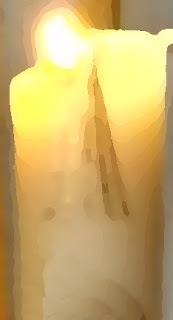 "We want to build something beautiful and what emerges from our hands is a grand and spectacular monstrosity. Such is the world in which God is obscured...."
"We want to build something beautiful and what emerges from our hands is a grand and spectacular monstrosity. Such is the world in which God is obscured...."This world is our world. As Christians, we must not try to escape the significance of this fact. We have been given a gift, the gift of faith. If we know God, it is not because we are wiser or stronger than everyone else, as if by our own power we have found a technique to clear the obscurity away. It is not our own greatness that has brought us to know God. And God is not a secret that we possess that allows us to exalt ourselves over others.
We "know God" (i.e. we have a relationship with the Mystery who is the origin and fulfillment of all things) only because He has come to meet us. In the places and times of this world, we have encountered God in Jesus Christ who reached out to us through the communion of His Church.
We can only offer something to others if it is the fruit of what we have received, of the work of Jesus that awakens our hearts, heals us, changes us, makes us live as a new creation, and live together as a new people who share His love. This is the love that God wills to communicate to the whole world, to every human person.
Without God's love, "religion" becomes just another spectacular monstrosity, and we are profoundly tempted to misuse the gift of faith to build our own misshapen constructions that only cast more dark obscure shadows upon our world. If we make the greatest arguments, and put forth the most coherent political programs and social theories, but do not have love, we accomplish nothing. We can say, "Lord, Lord," and construct megachurches, universities, and social programs; we can defend human rights and exhaust ourselves day and night fighting against evil, but without love we achieve nothing.
The world will remain in darkness. And, having hidden the lamps of His light, we will make it darker still. We will be all the more blind because we think we see.
But what is this "love"? It is God's gift that grows in us and is given through us in the measure that we surrender ourselves to Jesus in self-abandonment, offering, trust, obedience, and in the living faith that does the works of mercy, that lets others encounter the compassion of God.
Published on August 13, 2015 19:17
August 10, 2015
On the Feast of Saint Lawrence
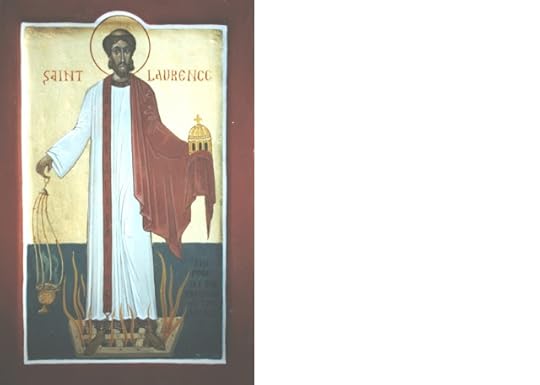
Martyr
A blood-red ember-glow
grows
to a fullness within my breast
as though Mars had been captured in glass,
removed from the dome of moonlit sky,
and set free below to frolic among dry sticks
at the woodland's edge.
Mars, of war.
And I am flame that rises like a fountain
from a candlewick consumed
and a raging river of fragrant wax,
and my effulgence fires the eyes of those who watch
and of those who keep their distance.
In a moment I am gone,
yielding to triumphant dawn
like the pink streaks of morning's first light,
and in the wake of my radiance
ashes
to color the hand of man.
~August 10, 1990
---------------------------------------------------------------------------------------------------------
This is a poem I wrote twenty five years ago in honor of Saint Lawrence, the great third century deacon and martyr of the church of Rome. It is reproduced here from my personal papers.
Published on August 10, 2015 20:33
August 8, 2015
For My Dominican Mentors and Friends
Published on August 08, 2015 20:19
August 7, 2015
The Long Summer at Gallipoli
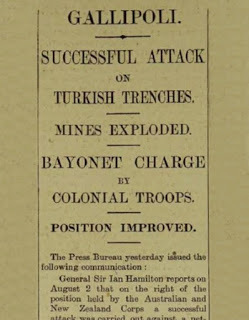 Western forces invade Muslim country. They expect easy victory, but are surprised to find tenacious resistance, difficult terrain, and high casualties. The invasion goes nowhere.
Western forces invade Muslim country. They expect easy victory, but are surprised to find tenacious resistance, difficult terrain, and high casualties. The invasion goes nowhere.So what do they do? They try it again.
And again.
And again.
Thus we arrive at the month of August in the year 1915. The night of August 6th saw the last of four attempts to break the Turkish lines beyond the beaches and the cliffs of the Dardanelles and open the route to the mythical Constantinople.
We generally associate the battle of Gallipoli with April 25, 1915. Our friends "down under" observe it as ANZAC Day (Australian and New Zealand Army Corps). The Aussies and Kiwis were heroes that day, and afterward, for their immense bravery and sacrifice in desperately trying to carry out an invasion that was not their idea.
Hardcore JJ blog fans recall, perhaps, that [...finishing]
Published on August 07, 2015 20:56
August 6, 2015
Transfiguration and the Grace of New Life
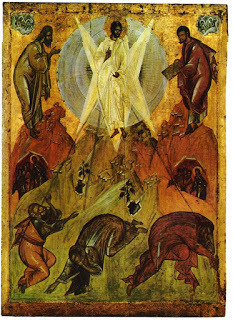 Transfiguration, Russian Icon, 14th century"On the mountain You were transfigured,
Transfiguration, Russian Icon, 14th century"On the mountain You were transfigured,O Christ our God,and your Disciples sawas much of your gloryas they could hold,so that when they should seeYou crucified,they would knowthat You suffered willingly,and would proclaim to the worldthat You are trulythe Splendor of the Father"(Kontakion for the day, Byzantine Liturgy).
Transfiguration.
A glimpse of glory. The voice of the Father: "This is my Beloved Son." How could Jesus have made Himself more "real" for these men? They saw all the miracles. They spent each day with Him, experiencing His tender gaze, marveling at His beauty.
The man who is God: they were with Him. They saw Him. How could they ever falter in their faith? Why, after everything, did they still give in to fear?
Peter. After everything, after the promise of the Keys, after the calming of the storm, after the light of Mount Tabor, after the ardor of a heart that said in the peak of human sincerity, "I would lay down my life for You," how could he deny Him? Yet Jesus drew Peter's heart back to Himself. "Lord, You know that I love You."
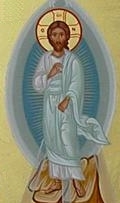 Our life is so fragile and our experience so fragmented that we cannot energize ourselves to persevere in fidelity to the Mystery of God's presence and His love for us, even when He dwells with us and breaks bread with us every day and proves Himself trustworthy again and again and again.
Our life is so fragile and our experience so fragmented that we cannot energize ourselves to persevere in fidelity to the Mystery of God's presence and His love for us, even when He dwells with us and breaks bread with us every day and proves Himself trustworthy again and again and again.And so He offers us the gift of His Spirit and the strength of His grace, the gift that empowers us to receive and to grow in newness of life in Him. We may fail, we may turn from Him, we may forget Him a thousand times a day, but still His grace and mercy call us continually to conversion and renewal. He gives us the capacity and the energy that we cannot generate from out of our own selves.
When we fall or forget His glory, He empowers us to rise up and remember Him again, turn to Him again, be surprised by Him again, and if we cry out to Him and beg Him for His mercy, to walk with Him all the way through the end. All the way through death.
In the whole course of our life, He is prompting us, "Turn to Me, listen to Me, let Me draw you to myself, let Me give you what you need to take each step." Without Him we can do nothing. With Him we will have eternal glory.
And He made us to be with Him, He wants us to be with Him.
Published on August 06, 2015 17:32
August 5, 2015
We Affirm Human Dignity and Yet We Are So Cruel... Why?
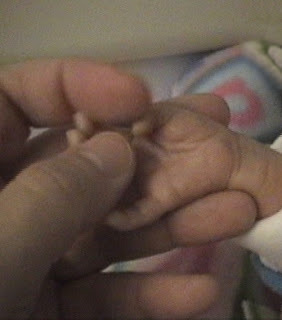 Two living human personsRecently the news and (especially) the Internet have presented for us some unbearable (but, sadly, not surprising) instances of human beings attacking other human beings.
Two living human personsRecently the news and (especially) the Internet have presented for us some unbearable (but, sadly, not surprising) instances of human beings attacking other human beings.There are many features of the events we've seen that are especially awful (but, once again, not surprising): the defenseless victims, the callous and ruthless dismissal of their humanity for money, and the pretense that the whole gruesome assault is being carried out in the service of human dignity and human freedom.
What we see here is also a problem that is peculiar to our time. Since the beginning of history there have been violence, murder, cruelty, and human trafficking. The distinctive mark of our emerging epoch, however, is the way we try to cloak all this nasty business under the mantle of "service," of "doing good," of human rights.
We want to affirm human dignity. We have this sense that it is crucially important to recognize and uphold the value of every human person. This is a tremendously good intention, which has washed up on the shores of the 21st century like a plank from a shipwreck. It is a strong plank. Much can be done with it. But it is not made to float by itself, in the midst of stormy seas.
The dignity of human persons is founded upon—indeed consists in—their being created in the image of God, and their eternal destiny in God.
It is the image of God that gives the human person a real inviolable status. Being "someone" means being in relation to the One who is the transcendent origin, sustenance, and fulfillment of all things. It means being a person who can know and love, who can freely give his or herself and who is called to belong freely to God. Ultimately, God alone is worthy of the human person.
Without this foundation, the term "human dignity" becomes subject to all kinds of subtle manipulation. Indeed, even terms like "good" become oblique when they have no roots beyond our own intentions and determination.
And this is the problem. Contemporary Western culture has inherited and in some ways deepened a profound and mysterious crisis about God. In the midst of the titanic explosion of human power over the natural world, God seems to disappear.
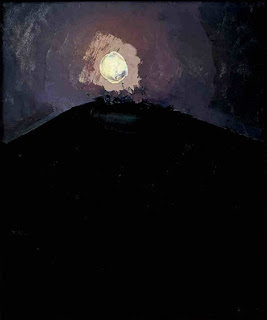 Our rationalistic ancestors pushed God to the margins of the universe, and eventually declared His "death." They bequeathed to us not only what they thought to be His "powers," but also the gigantic and perplexing responsibility of His goodness. Now we look at the 21st century and our power is dazzling indeed. We have found it difficult, however, to declare that our works are good.
Our rationalistic ancestors pushed God to the margins of the universe, and eventually declared His "death." They bequeathed to us not only what they thought to be His "powers," but also the gigantic and perplexing responsibility of His goodness. Now we look at the 21st century and our power is dazzling indeed. We have found it difficult, however, to declare that our works are good.When God created the world, He saw that it was good (see Genesis 1). We, however, with all our amazing power and its fruits, live in our world without the awareness of God's existence. Not surprisingly, we are racked with anxiety regarding what is good in all our achievements (and there is a great deal of good—wonderful, magnificent good—in the achievements of our time). In fact we are haunted by the ambivalence of what we've done, and we search desperately for some kind of perspective that will allow us to distinguish and foster the good while correcting our failures.
In recent times we have also given great attention to the human person. We have learned so many good things about human life and human aspirations. We have discovered real ways to help people to live with greater dignity, and we want to affirm and build up human persons and communities. But with the eclipse of God and its corresponding dark cosmic solitude, we face this strange paradox: even as we become more knowledgeable about the workings of the world, and more sensitive to various aspects of the dignity and value of the person, we have no way of bringing it all together, and no sure criteria for how to apply our knowledge and our power in complicated and difficult situations.
The result is that—without even realizing it—we gradually but inexorably submit to the "logic" of power itself, which "builds" by dominating and ultimately destroying anything that resists it.
Of course, this is terrifying. No one wants to acknowledge that we are lost, that for all of our good intentions we do not know what is good. Thus, we adopt the intellectual apparatus of power: ideology. We simply affirm the goodness of what we do. We use a veneer of weak argumentation, obfuscation, and deception (especially self-deception).
When all else fails, we assert and define that our way is good even in the face of all evidence to the contrary. This means that we also refuse to listen to those who would remind us of our blindness. In any case, it has become especially important for us to feel good about what we do. In the social realm, we want to feel that we are empowering human persons and serving human dignity.
 We would like to think we are building a kinder and gentler world. But violence pours in upon us from every side. Even as we become more attentive and more skilled in the art of saving lives in some places, we completely disregard the value of human life in others. We are divided against ourselves: wanting peace but waging war, wanting community but building walls of isolation, seeking healing yet constantly hurting one another. We want to build something beautiful and what emerges from our hands is a grand and spectacular monstrosity.
We would like to think we are building a kinder and gentler world. But violence pours in upon us from every side. Even as we become more attentive and more skilled in the art of saving lives in some places, we completely disregard the value of human life in others. We are divided against ourselves: wanting peace but waging war, wanting community but building walls of isolation, seeking healing yet constantly hurting one another. We want to build something beautiful and what emerges from our hands is a grand and spectacular monstrosity.Such is the world in which God is obscured, and even the most sincere and ardent assertions and feelings about human dignity lose their bearings and cannot engage real life, real human situations, sufferings, and frailty.
I look at myself. I know that God exists, that He is the Source of my very being, and the foundation of my dignity as a person. I know that I am made in His image: He who transcends the whole universe and by this very incomprehensible transcendence is nearer to me than I am to myself. Still, I see how much I fail to remember Him, to live my own life with gratitude, and to love the human persons He has entrusted to me.
It is not enough to acknowledge God. We must open our hearts and let ourselves be loved by Him, so that by the power of His love we are enabled to love Him in return. And still the path is narrow, the path that leads to God and passes through the relationships He gives me with the real human persons who are in my life. Yet I know that here is His gift; here is where I find His face.
With all of this, my life is still full of violence, full of the daily failure to recognize the dignity of the human person—the image of God—in my wife and children, family and friends, and in all the people He places in my path (especially the ones I don't like, or who are inconvenient to me or against me—my "enemies").
My life is full of the forgetfulness of God.
My own attitude is still largely shaped by the common mentality of our times that views the world without God, and conditions people to live as if God did not exist. I must first of all recognize this fact about myself. I have no grounds to boast in front of my third millennial brothers and sisters. We are all sinners. I am all the worse, because I have done so little with the understanding that has been given to me.
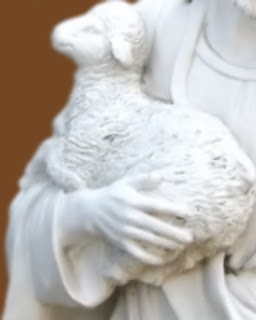 I am a sinner. I must beg forgiveness for my own sins and resolve to take up once again the arduous struggle for healing and renewal. I do so, however, with confidence, because He offers Himself to me in His mercy. My hope and my strength is in Him.
I am a sinner. I must beg forgiveness for my own sins and resolve to take up once again the arduous struggle for healing and renewal. I do so, however, with confidence, because He offers Himself to me in His mercy. My hope and my strength is in Him.With penitential hearts, we can (and we must) face the reality of our time: people are trying to build up the world without God—they are desensitized to the need for God by the illusion of spectacular human displays of material power. Whatever may be their good intentions, they conceive a world in which power is the ultimate reality.
How can anyone expect such a world to respect human life?
Still there is something in the confused hearts of people; there is this desire for a better world, and a better, truer life for themselves. The eclipse of God in our time has only rendered more desperate the ineradicable longing of the human heart, however much people try to bury it. People carry this desire in them along with all their violence that weighs them down; it endures, perhaps as a cry for help, a cry that recognizes the need for something else.
We must also take this cry into our own hearts and turn it toward the love of God. We must beg for His mercy and do the works of mercy through which He shows Himself even in the greatest darkness. He defeats violence by answering it with an unconquerable love, and such love resonates even in the places where all the most desperate and most neglected human longings try to hide.
His mercy is our hope, and living the love that reveals and communicates His mercy is our task.
Published on August 05, 2015 13:09
August 2, 2015
The Expectation of August
 We have arrived at the beginning of August 2015. These are the "dog days" of summer.
We have arrived at the beginning of August 2015. These are the "dog days" of summer.In the United States of America, however, August -- notwithstanding its blazing heat, humidity, and haze, and its buzzing cicadas high in the trees -- has become back-to-school-month. Almost all schools start up in August, and kids have to start thinking about cramming in their summer assignments and getting their gear together.
For us, this particular August heralds a great transition in the family. By the middle of the month, we'll be packing John Paul off to college.
Granted, he's going to Christendom College, which is only a few miles down the road from his high school alma mater. He won't be far away, and he will be entering into one of the great formative experiences of his life.
 We also know that he will have good companions, and that Jesus will remain at the center of his college experience. I have no illusions about the human fragility and limitations of this college. I also know its value. I devoted years of my life (and quite a bit of my health) to help build it up into what it is today.
We also know that he will have good companions, and that Jesus will remain at the center of his college experience. I have no illusions about the human fragility and limitations of this college. I also know its value. I devoted years of my life (and quite a bit of my health) to help build it up into what it is today.What is most important, however, is that at its foundation the college has a charism. Jesus touches hearts and changes them in that place, and the grace of the Holy Spirit nurtures and brings growth to seeds already planted.
It's a bumpy road, with zigs and zags and holes and dust. Of course. It's made by human beings. But it's a road. It's a pilgrimage route and it's going in the right direction. It leads to the juncture of further roads, to the journey of adulthood.
Sometimes people lose their way on routes that lead nowhere (again, human beings). Still they have been given some sense of what the journey of life is seeking, and they have friends who can help them remember.
And Jesus is there.
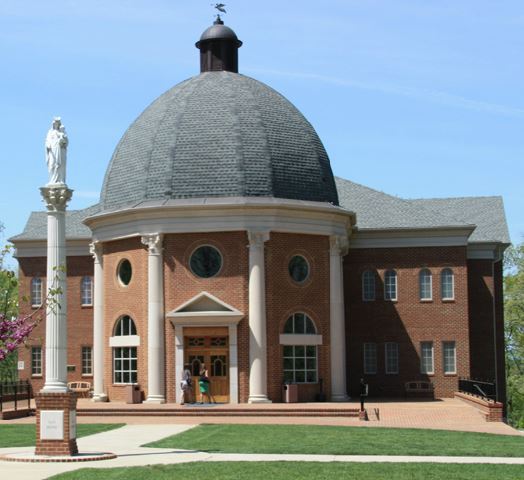 Christendom College library (see website www.christendom.edu)
Christendom College library (see website www.christendom.edu)
Published on August 02, 2015 13:00
August 1, 2015
The "Colorful" End of July
 July began as a colorful month for everybody.
July began as a colorful month for everybody.Fireworks filled the air all over the United States as we celebrated the Fourth of July.
We had plenty of good fireworks shows right in the neighborhood. That's one of the benefits of living in a small town.
The month continued to be colorful in surprising ways, such as the blossoming of the Asian Hibiscus in our front yard:

But the end of July was especially "colorful" to the heart. The feast of Saint Ignatius of Loyola yesterday brought back memories of Rome, as it always does. I posted about it on social media.

The day was topped off by the rising of the second full moon of the month of July, which is known as the "blue moon." On occasion the moon does look blue (due to atmospheric conditions) but last night it was blue only in our imaginations.
Still it was quite a sight for the end of a colorful month:

Published on August 01, 2015 08:38




